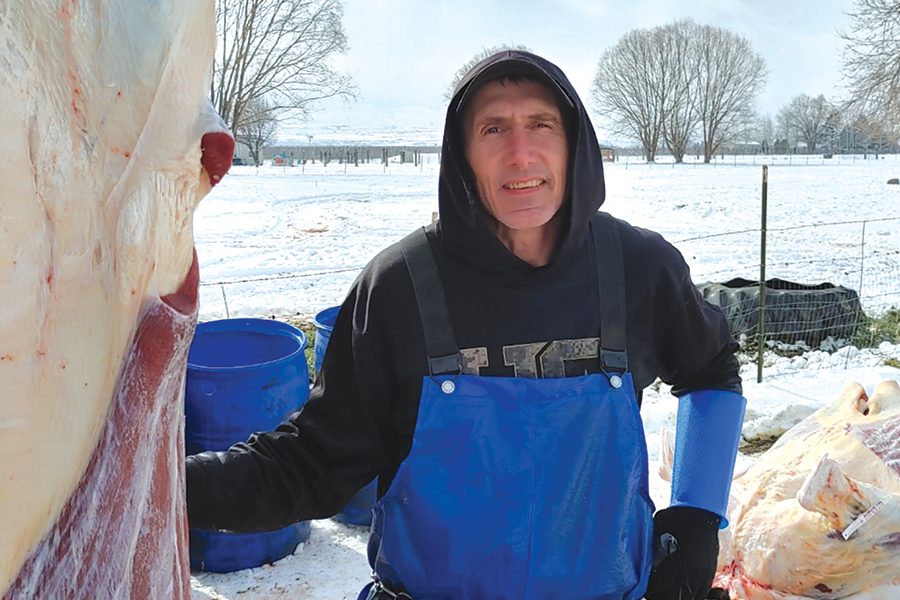
Home » State grant helps Gene’s Custom Slaughter invest in growth
State grant helps Gene’s Custom Slaughter invest in growth

March 15, 2021
A state grant is helping a West Richland custom slaughter business grow to meet rising demand from small farmers and ranchers.
Gene’s Custom Slaughter, owned since 1993 by Stacy McCorkle, used the grant to buy and equip two trucks to travel to customers through the Mid-Columbia. McCorkle is training his son to operate the second truck and will keep the third in reserve as a backup.
Gene’s is one of about 50 small meat processing operations that shared $5 million in pandemic relief grants funded through the federal coronavirus relief bill, according to the Washington Department of Agriculture.
The grants of up to $150,000 acknowledge the role small processors play in the food supply chain. The money aimed to improve availability of meat, mitigate expenses related to Covid-19 and improve slaughter capacity.
McCorkle said demand was already strong when Covid-19 shortages sparked demand and caused supply chain challenges early in the pandemic, when commercial processors faced shutdowns over infections.
He focuses on beef, pigs and sheep and handles some buffalo, killing and processing them in the places where they’re raised. Customers book his services months or even a year in advance to coincide with when the animal is mature.
“All my shops that I slaughter for are expanding,” he said. A combination of pandemic-stocking and interest in locally-raised food led to a rise in customers investing in freezers. That gave to a rise to demand for halves and quarters.
Small growers and even people who haven’t raised animals for meat before are getting into the business.
“The cool thing is, people who had never raised an animal will buy an animal,” he said.
McCorkle grew up in Burbank, where his father owned Burbank Market and a related meat-smoking business.
He learned to smoke and cut the meat and to process deer and elk. He tagged along when animals were slaughtered for his dad. He found the work intriguing.
He bought Gene’s in 1993 and now serves customers from Mattawa and Sunnyside to Walla Walla and Dayton, and to Pendleton and Milton-Freewater in Oregon. He is licensed in both states.
He’s served generations of small growers, families that slaughter a handful of animals a year.
“I get homemade pie, cookies, jam. It’s like going back in time, being the milk guy,” he said.
Longtime customers Debra and Mike Peale raise cows as well as horses on 13 acres in Benton City. Debra is retired from Hanford and Mike works for the Hanford Patrol. They started raising cows to support the cost to keep horses.
They’ve turned to Gene’s to slaughter about eight animals a year for two decades. They book his services up to a year in advance. The couple bought weaned calves from a neighbor and raise them on grass and alfalfa until they are about 2 years old.
Slaughtering is a collaborative effort that starts with keeping the animals calm and unsuspecting until the fatal shot is delivered. On a February wintry day, McCorkle parked his truck out of sight before getting to work on the four Angus he was processing for the Peales that day.
The idea is to avoid agitating animals, McCorkle said. The owners will approach the animals as usual while McCorkle slips behind with a .22.
“If an animal is excited and nervous, we don’t process it that day. It makes that big of a difference in the quality of the meat,” he said.
On the Mid-Columbia’s warmer days, he will slaughter two at a time, process them and take the sides of beef to the butcher shop, then return to process the remaining two.
Turning a 1,200-pound Angus into 750 pounds of hanging beef is labor intensive and demands a full array of tools. Once the Peales’ animals were down, McCorkle moved his truck to the site and got to work.
At every stage, McCorkle sprayed the area with hot water to keep the process sanitary. His trucks have generators, hot water heaters and compressors and the interiors are stainless steel.
McCorkle makes the big cuts with a powered saw, but he keeps an old school meat cleaver in the truck as a memento of the old ways of doing it.
Once the Peales’ cows were processed, the quartered sections were delivered to a local butcher shop to age a week before being cut into more familiar products.
Every animal Gene’s processes is presold, with the buyers identified by tags attached to the bodies. The couple kept meat for themselves and sold the rest to family, friends and colleagues from Hanford.
“We’ve had the same clients for years. Selling beef is not a problem,” Debra said.
Local News Food & Wine
KEYWORDS march 2021





